Special Report
America's 26 Top Selling Beers
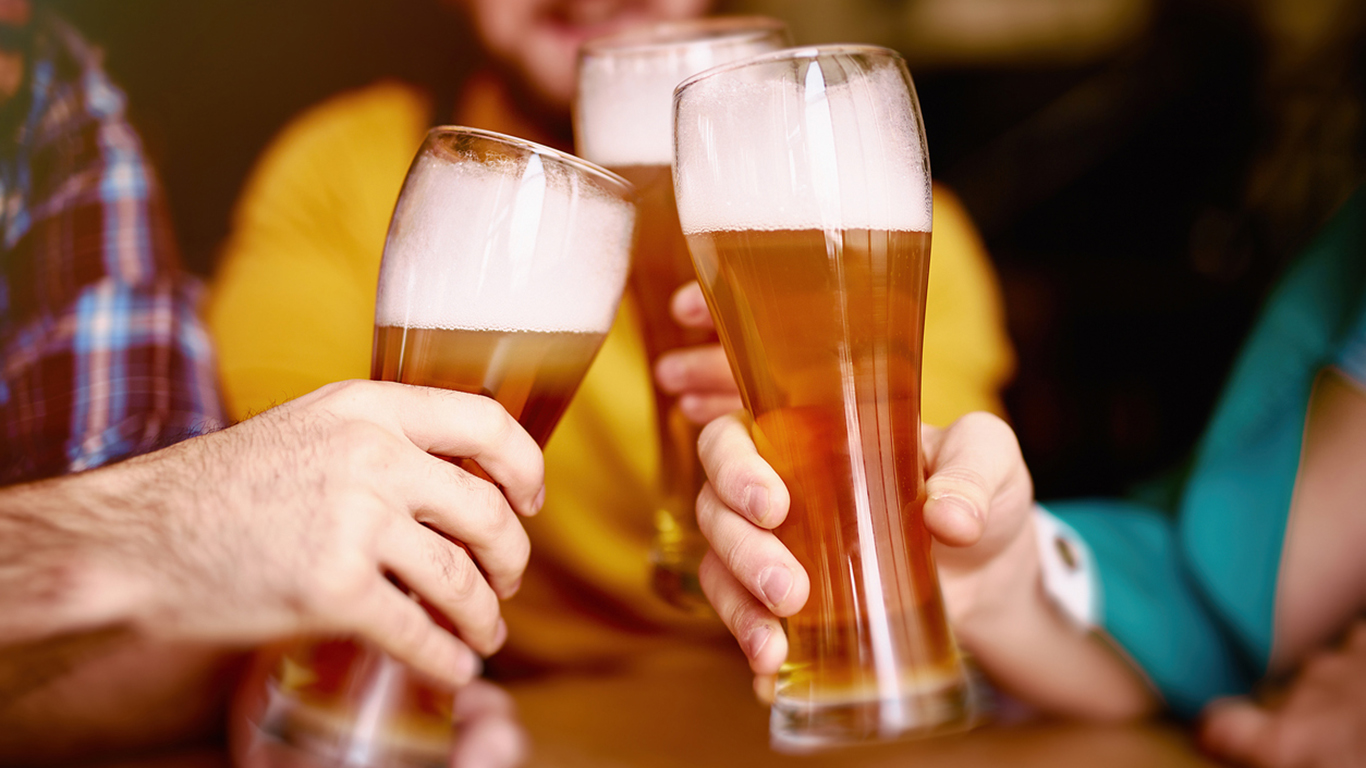
Published:
Last Updated:

Americans love beer. Some 40% of drinkers in the U.S. list the hoppy concoction as their alcoholic beverage of choice. U.S. beer consumption totaled nearly 75 litres per person in 2016 alone.
A large portion of the beer consumed comes from major beer distributors such as Molson Coors Brewing Company and Anheuser-Busch InBev. These are the types of beers you will likely see advertised during sporting events on TV — brews like Bud Light, Miller Lite, and Coors Light. Millions of barrels of these beers are shipped across the country each year.
24/7 Wall St. reviewed shipping data from Beer Marketer’s Insights, a U.S. brewing industry trade publisher, to determine America’s 26 top selling beers.
Though these large American brews sell millions of barrels a year, many are waning in popularity. Benj Steinman, president of Beer Marketer’s Insights, told 24/7 Wall St. that while these familiar beers from large brewers have fallen in favor, two major segments of the American beer market have taken their place.
“The two main areas of the industry that have gained in [roughly the last] decade have been craft and Mexican imports,” Steinman said. Many American beer consumers want to try new beverages, leading to a rise in craft beer sales, though that has leveled off over the past few years, Steinman added.
The rising demand for beer brands from Mexico has vaulted lagers like like Modelo and Corona up the list of America’s favorite beers. These Mexican imports have largely avoided the sales decline that has been common among beers like Miller Lite or Bud Light, instead posting substantial year-over-year growth. According to Steinman, three reasons are behind the increased demand for Mexican beers: a growing Hispanic population in the United States, effective marketing campaigns, and the brands’ broadening appeal with the general market.
Overall, total U.S. beer shipments were down roughly 1% in 2017 and look to be headed that way in 2018 as well, according to Steinman. This comes after three consecutive years of modest growth in 2014, 2015, and 2016. This slight dip in beer shipments may be attributable to the rise in popularity of alternate alcoholic drinks.
According to a Gallup poll, more than a quarter of American drinkers listed wine as their preferred beverage — the largest share in the poll’s 25 year history. Spiked seltzers, such as Mike’s Hard Lemonade, are also cutting into the consumption of legacy beer brands, particularly light beer. Many spiked seltzer brands had double digit percentage point growth in the last year, according to Steinman.
24/7 Wall St. reviewed domestic shipping volume data provided by industry advocacy group Beer Marketer’s Insights to identify America’s biggest beer brands.
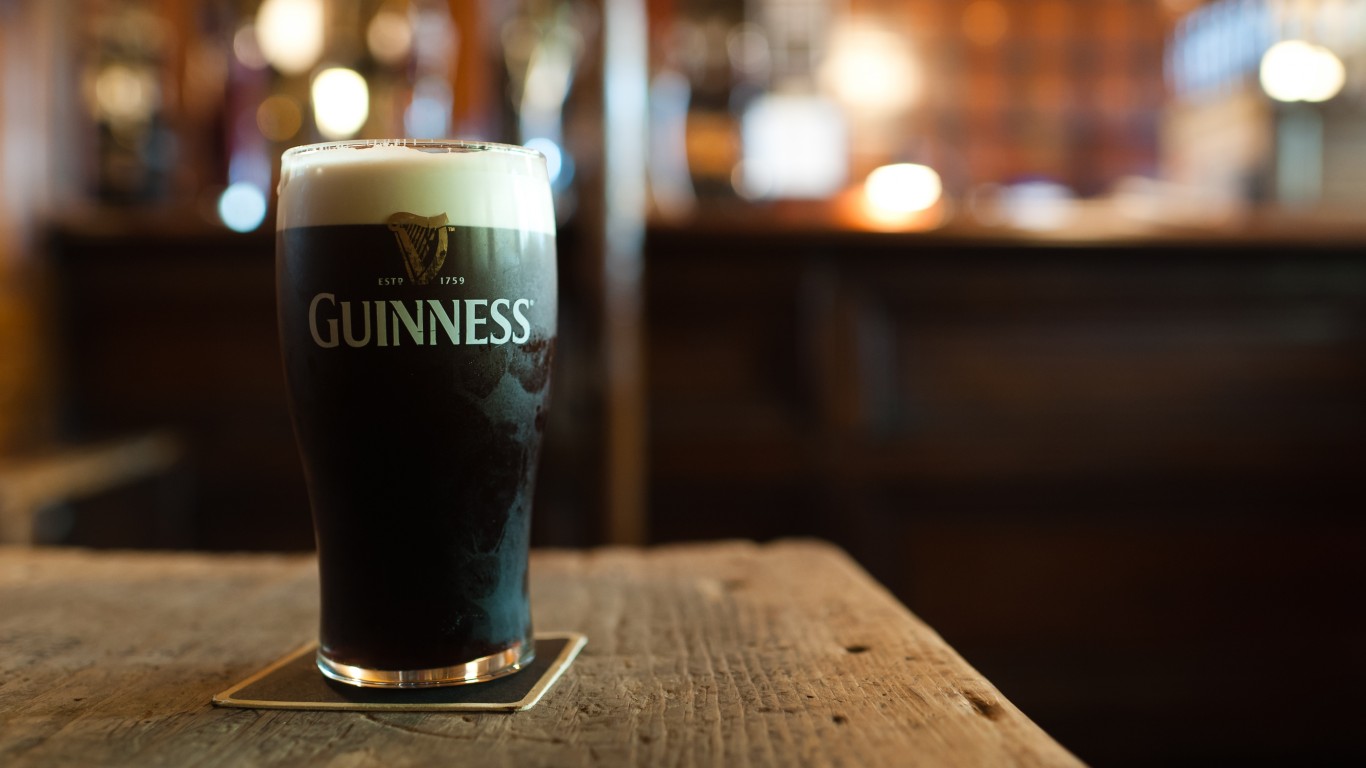
26. Guinness
> Parent company: Diageo
> Barrels shipped in 2017: 1.1 million
> Change from 2016: 2.3%
> Market share: 0.5%
While Americans typically prefer domestic beers, this Irish brew sells well. The brewer shipped over 1 million barrels of Guinness in the U.S. market in 2017 — including the Guinness Stout, which made the brewery famous. Americans also tend to prefer lighter lagers, but Guinness is best known for its dark draught, described by Guinness as “perfect balance of bitter and sweet.”
[in-text-ad]
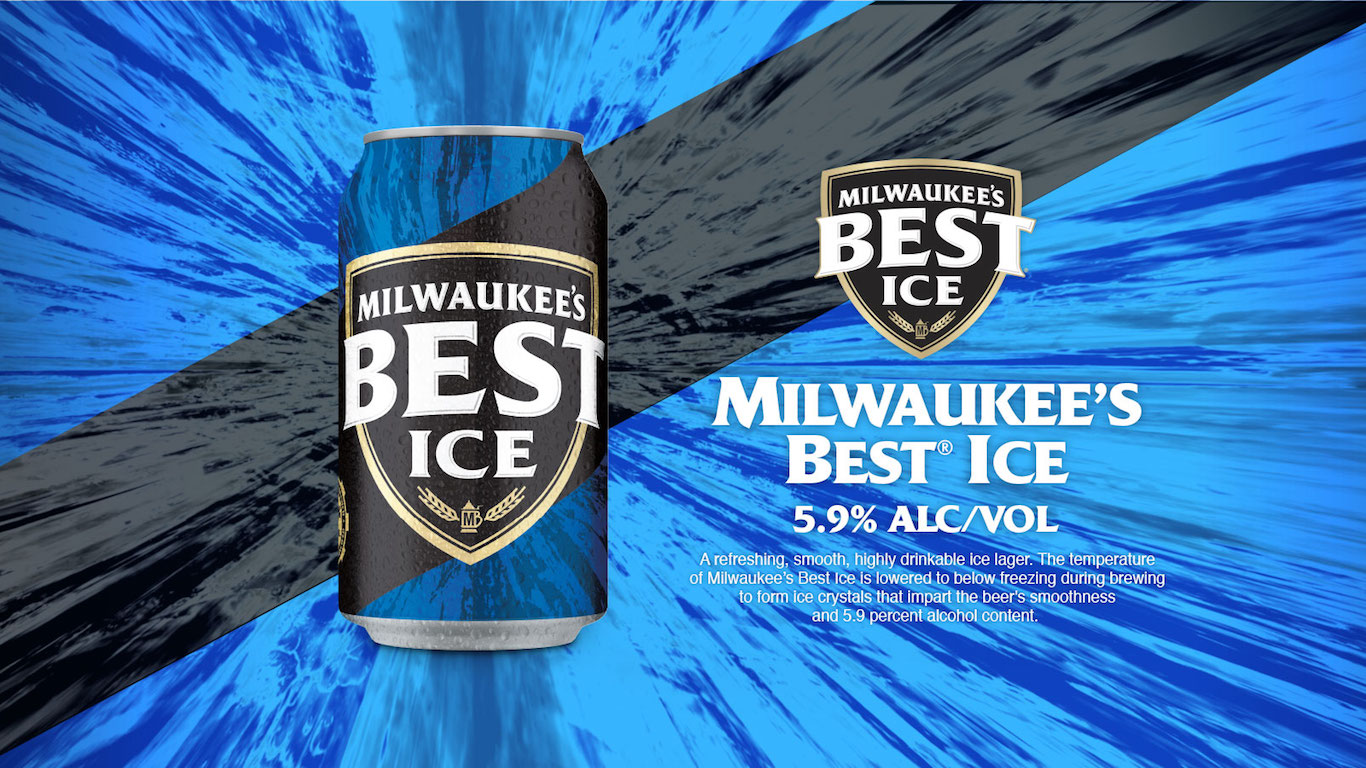
25. Milwaukee’s Best Ice
> Parent company: Molson Coors Brewing Company
> Barrels shipped in 2017: 1.2 million
> Change from 2016: -9.7%
> Market share: 0.5%
Milwaukee’s Best Ice is one of several ice-style lagers that rank among America’s favorite beer brands. As the name suggests, ice beers are chilled to below freezing during the brewing process, forming ice crystals that supposedly imbue the brew with a smoother flavor. In the case of Milwaukee’s Best Ice, it also increases the alcohol content by more than a full percentage point to 5.9%, compared to Milwaukee’s Best Premium.
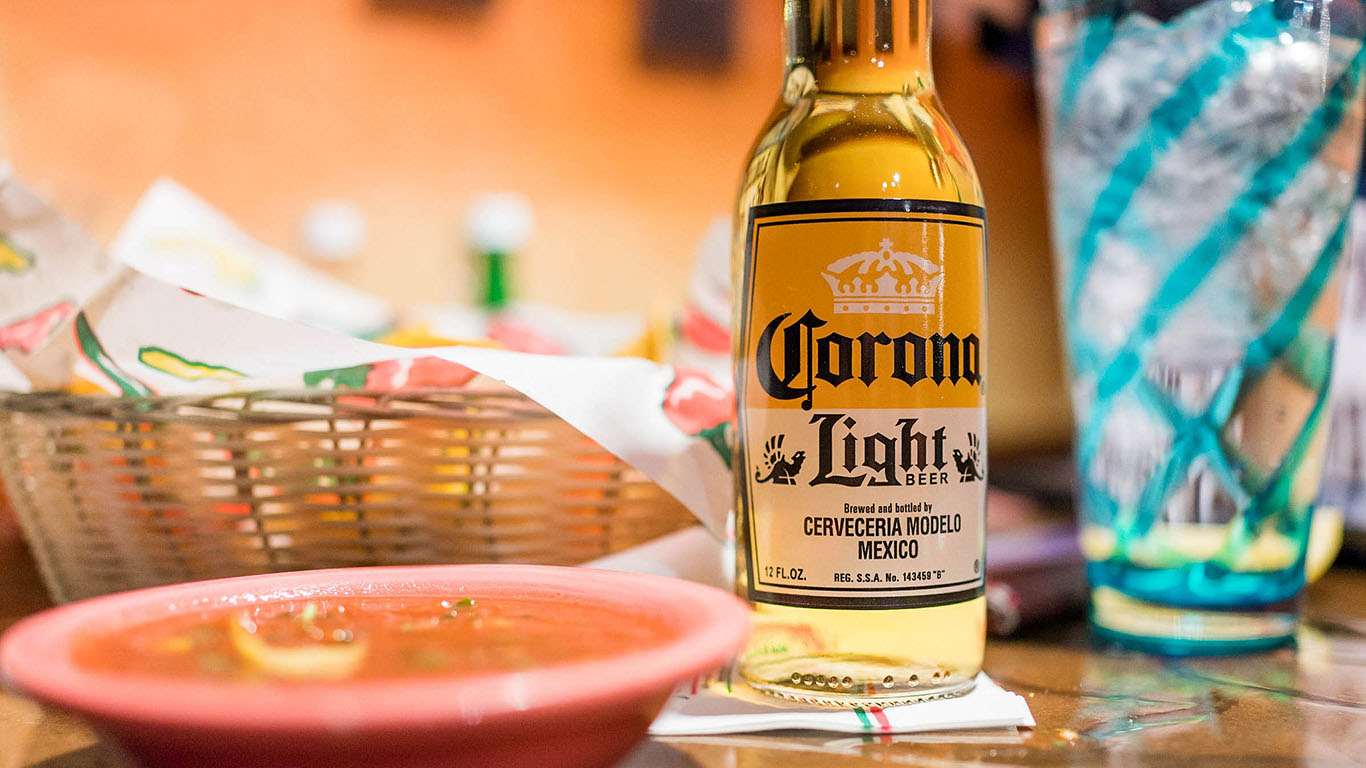
24. Corona Light
> Parent company: Constellation Brands
> Barrels shipped in 2017: 1.2 million
> Change from 2016: 1.7%
> Market share: 0.6%
Along with many other Mexican-style lagers, Corona Light is exploding in popularity in America. Not only does the U.S.’s growing Hispanic population often prefer to stick with familiar beers, but the brand is also enjoying increased popularity across the general population. Corona Light is a lower calorie alternative — 99 calories per 12 oz. bottle — to the 149 calories in Corona Extra.
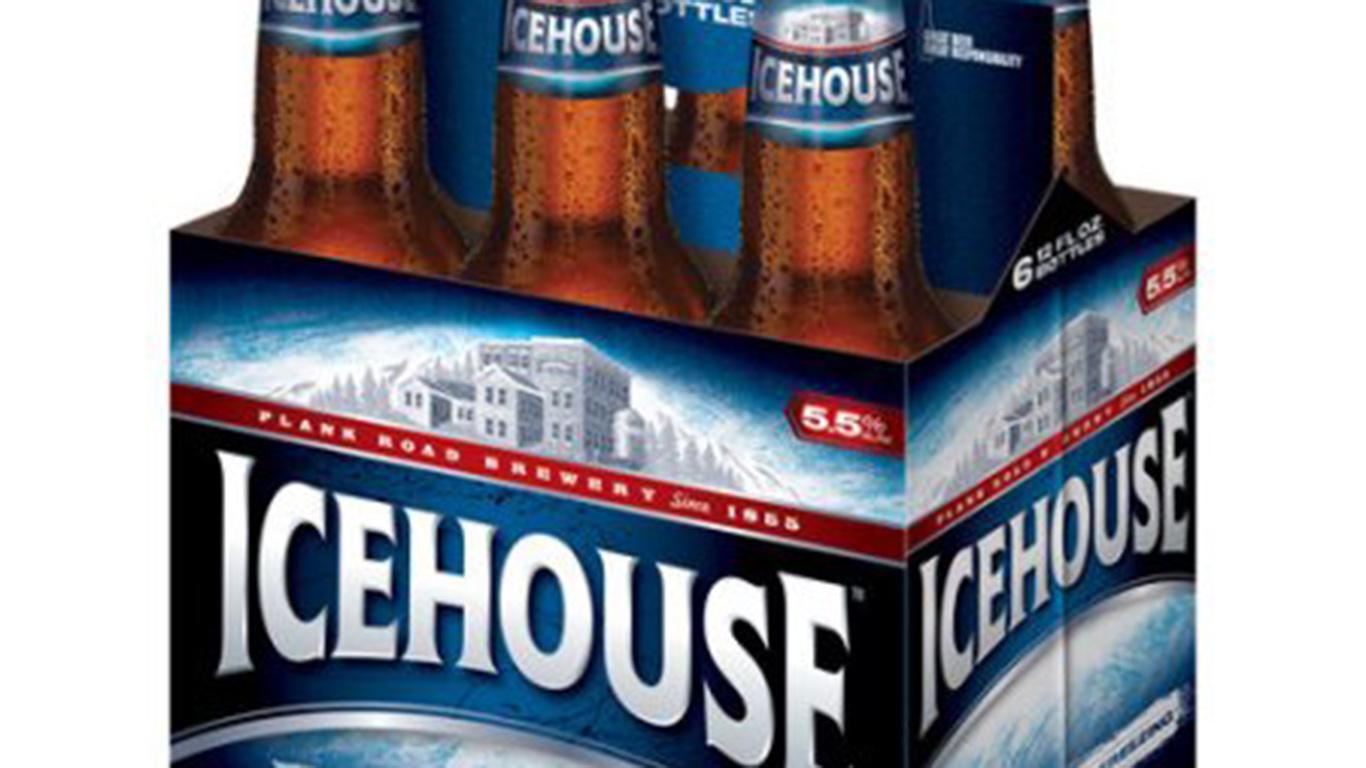
23. Icehouse
> Parent company: Molson Coors Brewing Company
> Barrels shipped in 2017: 1.3 million
> Change from 2016: -7.0%
> Market share: 0.6%
In Texas, an icehouse is an old-style neighborhood tavern, at least partially open to the outside. However, the Icehouse lager, brewed by Molson Coors Brewing Co., has nothing to do with Texas. Its name indicates that it’s an ice beer, in fact the first one produced in America, introduced in 1993.
[in-text-ad-2]
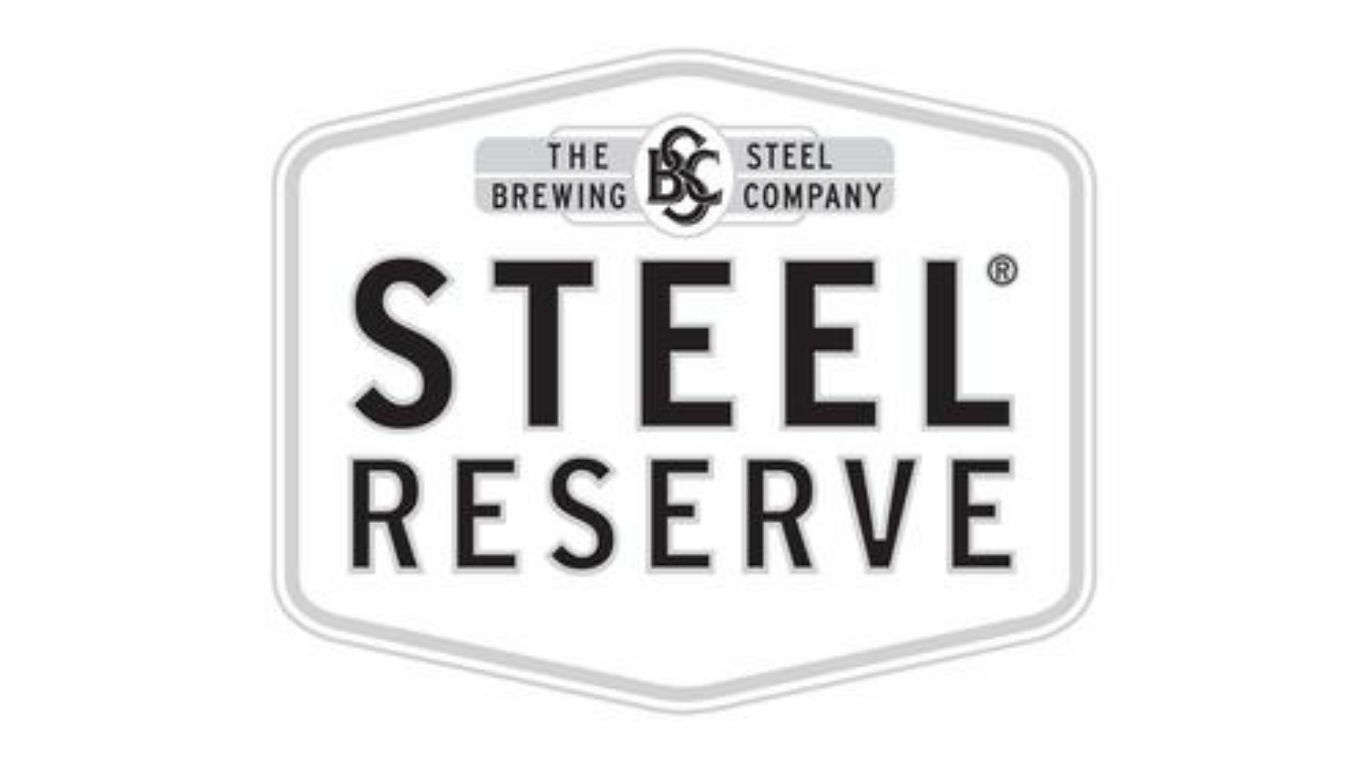
22. Steel Reserve
> Parent company: Molson Coors Brewing Company
> Barrels shipped in 2017: 1.6 million
> Change from 2016: -1.5%
> Market share: 0.8%
Steel Reserve differs from many of the beers on this list because of its high alcohol content. Many of America’s favorite brews hover around 5% alcohol by volume. Steel Reserve has 8.1% ABV and is considered a malt liquor.
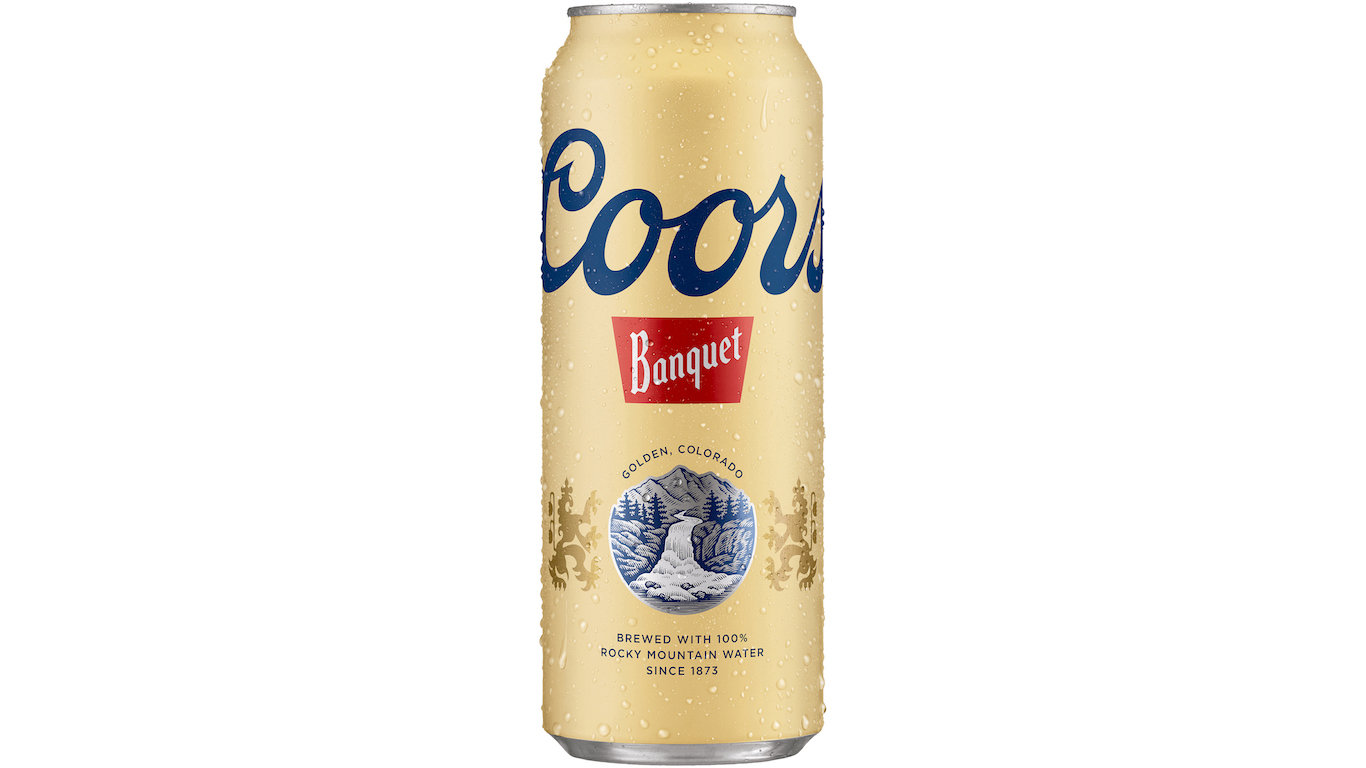
21. Coors Banquet
> Parent company: Molson Coors Brewing Company
> Barrels shipped in 2017: 1.7 million
> Change from 2016: 2.7%
> Market share: 0.8%
When Albert Coors founded his brewery in Golden, Colorado in 1873, he called his first beer Golden Lager. Miners working in the area ate heartily when the working day was done, and the locally produced beer was a favorite at their banquets. After Prohibition, the Coors company added the name “Banquet” to the lager label in honor of those miners’ feasts. Still produced only in Golden, the beer is brewed with Rocky Mountain water and locally grown Moravian barley.
[in-text-ad]
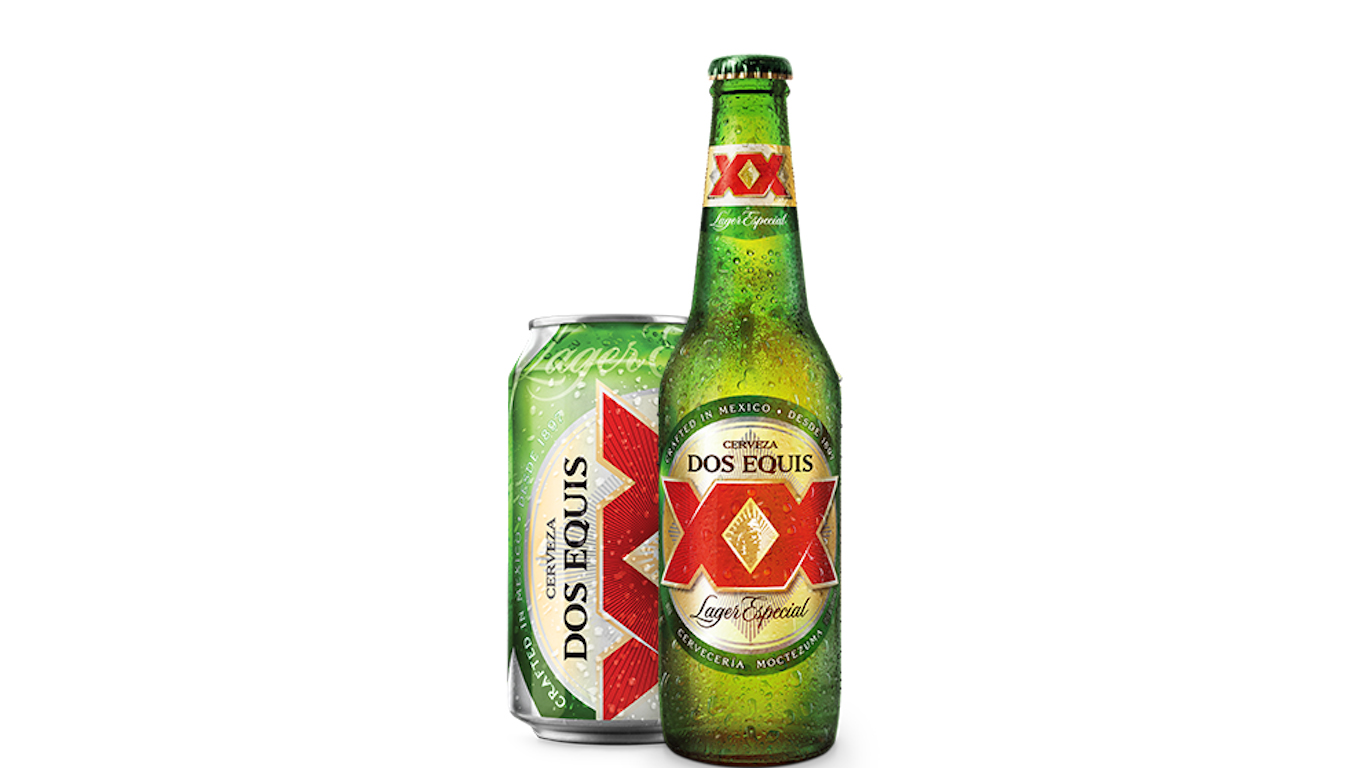
20. Dos Equis
> Parent company: Heineken International
> Barrels shipped in 2017: 2.0 million
> Change from 2016: -1.3%
> Market share: 0.9%
Dos Equis is a combination of German brewing techniques and Mexican ingredients. In the late 19th century, Wilhelm Hasse founded a brewery in Veracruz, Mexico. The brand was named in honor of the upcoming 20th century, as the Roman numeral XX means 20. Dos Equis is a pilsner-style beer.
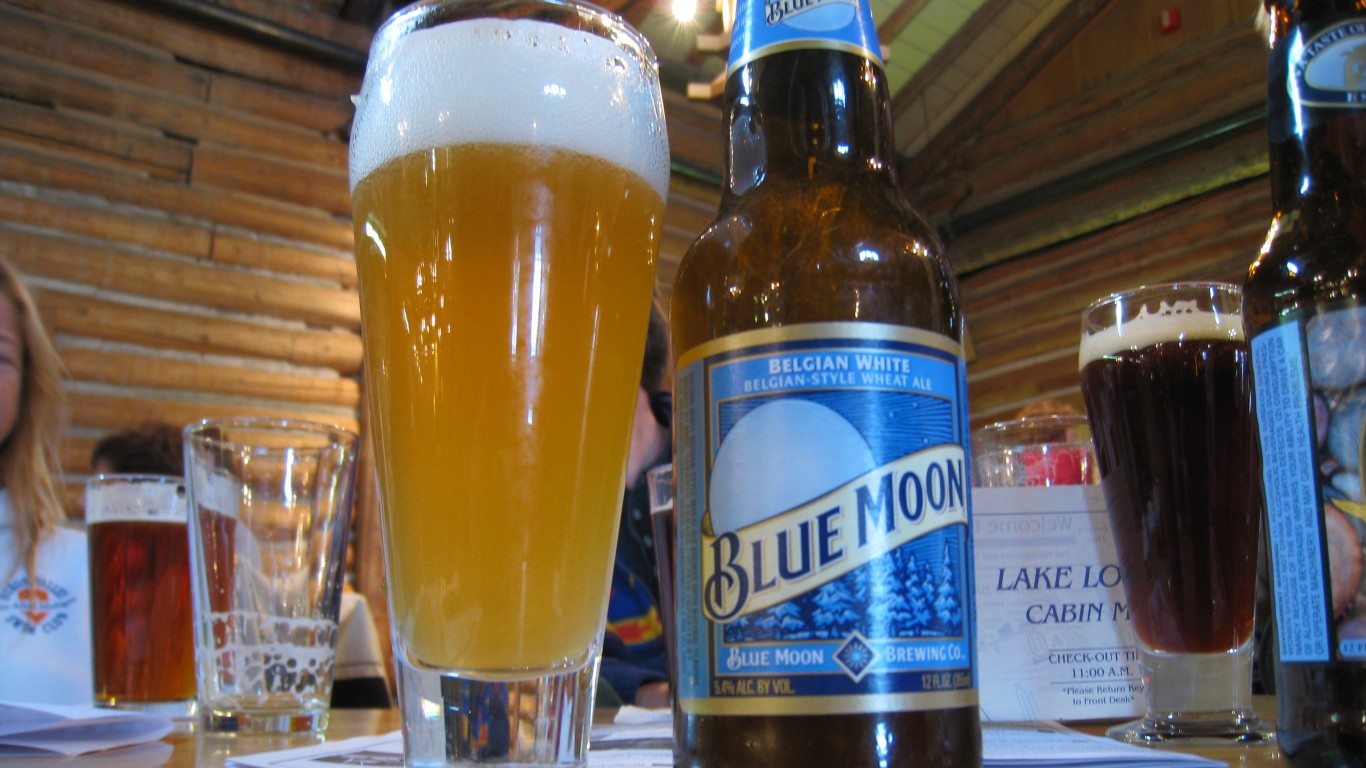
19. Blue Moon Belgian White
> Parent company: Molson Coors Brewing Company
> Barrels shipped in 2017: 2.1 million
> Change from 2016: -0.2%
> Market share: 1.0%
Blue Moon Belgian White is a Belgian-style wheat ale, a genre characterized by a cloudy appearance (it’s unfiltered), an orange-peel citrusy tang, and a bit of spice, often coriander. The beer has been the subject of controversy and even a lawsuit because it’s marketed as if it were a craft beer when in fact it’s mass-produced by Molson Coors, the world’s third largest brewing company.

18. Yuengling Lager
> Parent company: D.G. Yuengling & Son, Inc.
> Barrels shipped in 2017: 2.2 million
> Change from 2016: -0.9%
> Market share: 1.0%
Yuengling is one of the few major American brewers that is still family owned. The Pennsylvania-based brewery is also the oldest in America, making beer for nearly 200 years. It still ranks in the top 20 beer brands in terms of barrels shipped, an impressive feat considering that it’s only available in the eastern United States.
[in-text-ad-2]
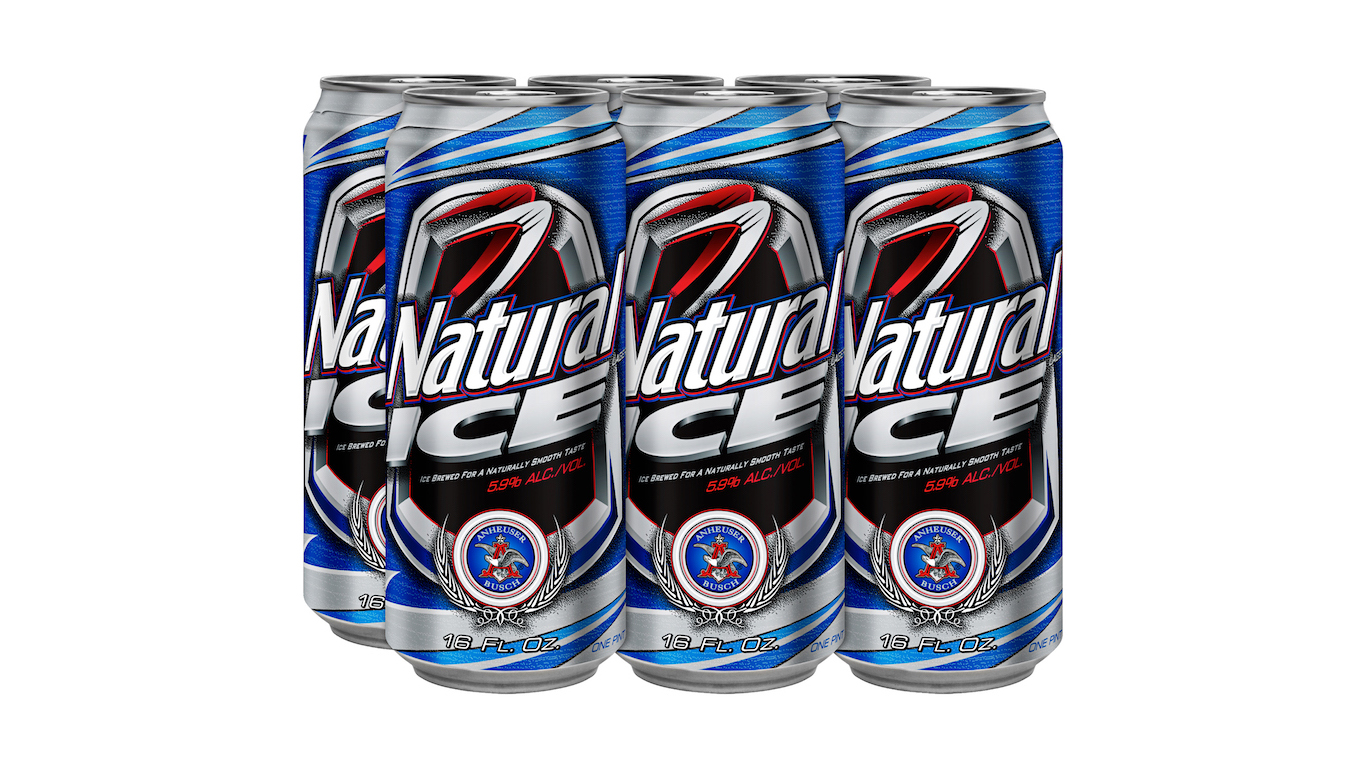
17. Natural Ice
> Parent company: Anheuser-Busch InBev
> Barrels shipped in 2017: 2.4 million
> Change from 2016: -8.5%
> Market share: 1.1%
An ice-brewed lager made with both malted barley and corn, Natural Ice is a spinoff from Anheuser-Busch’s Natural Light — popularly known as Natty. Slightly higher in alcohol content than the company’s Bud Ice (5.9% vs. 5.5% ABV), it is considered by reviewers to be bland but clean in flavor.
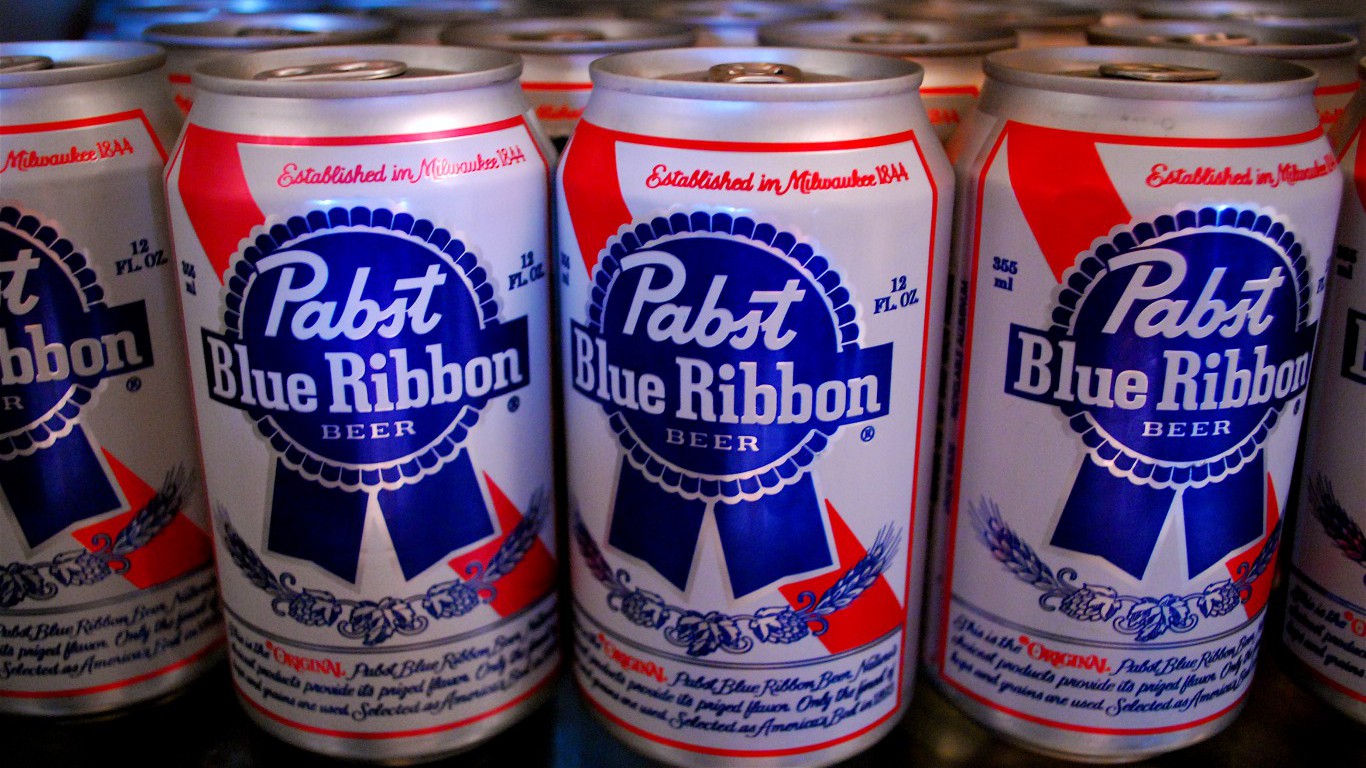
16. Pabst Blue Ribbon
> Parent company: Blue Ribbon Intermediate Holdings
> Barrels shipped in 2017: 2.5 million
> Change from 2016: -0.6%
> Market share: 1.2%
Pabst Blue Ribbon has gained a reputation as a beer for so-called hipsters. But the real reason for its recent sales resurgence may have more to do with price. During the recession, PBR sales picked up, as it served as a cheap alternative at the bar. As the economy has picked up, sales have flattened for the pilsner.
[in-text-ad]

15. Bud Ice
> Parent company: Anheuser-Busch InBev
> Barrels shipped in 2017: 2.6 million
> Change from 2016: 2.0%
> Market share: 1.2%
Though beer critics have called Bud Ice (along with other ice beers) lacking in personality, this ice-brewed sibling of Bud Light — America’s best-selling beer — has shipped an increasing amount of barrels each year since 2014. It’s comparatively low in calories for a non-light beer, with 123 per 12-ounce bottle (the company’s Natural Ice has 130).
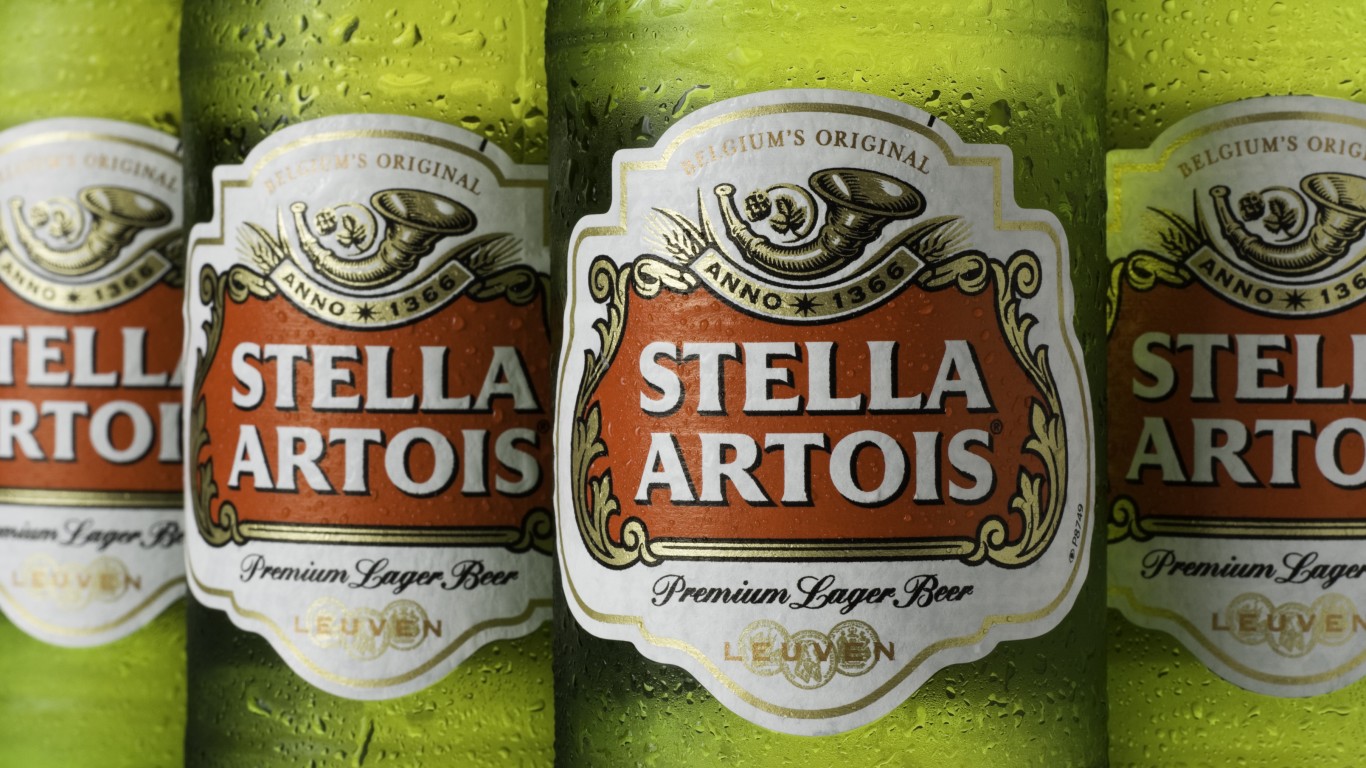
14. Stella Artois
> Parent company: Anheuser-Busch InBev
> Barrels shipped in 2017: 2.7 million
> Change from 2016: 10.9%
> Market share: 1.3%
Stella Artois is one of the oldest beers available in America, as its roots stretch back about three centuries to Leuven, Belgium. Just recently, it has become one of the fastest-growing beers in the U.S. Its shipments have grown by more than 10% from 2016 to 2017, one of the biggest growths of any major beer.
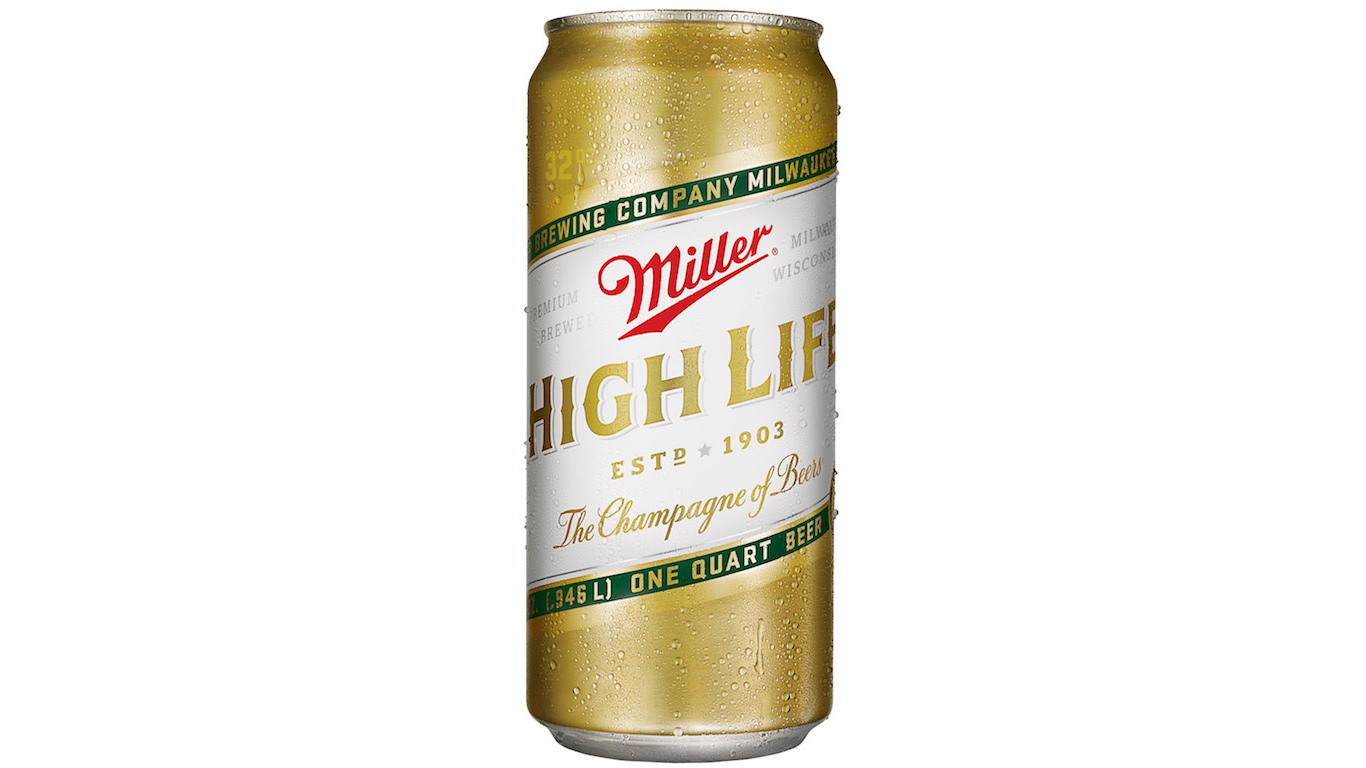
13. Miller High Life
> Parent company: Molson Coors Brewing Company
> Barrels shipped in 2017: 3.5 million
> Change from 2016: -1.5%
> Market share: 1.6%
A golden pilsner, this popular beer was created in 1903 by brewer Frederick Miller. Miller supposedly gave it its name because he believed that the “high life,” i.e. good life, should be available even to those who could only afford to drink beer. To drive home his point, he added the slogan, “The Champagne of Beers,” to the label. Bottled beer was uncommon when the brand launched, and Miller gave his bottles long necks reminiscent of Champagne bottles. At various times in its history, the beer also had Champagne-style foil coverings over the bottlecaps.
[in-text-ad-2]
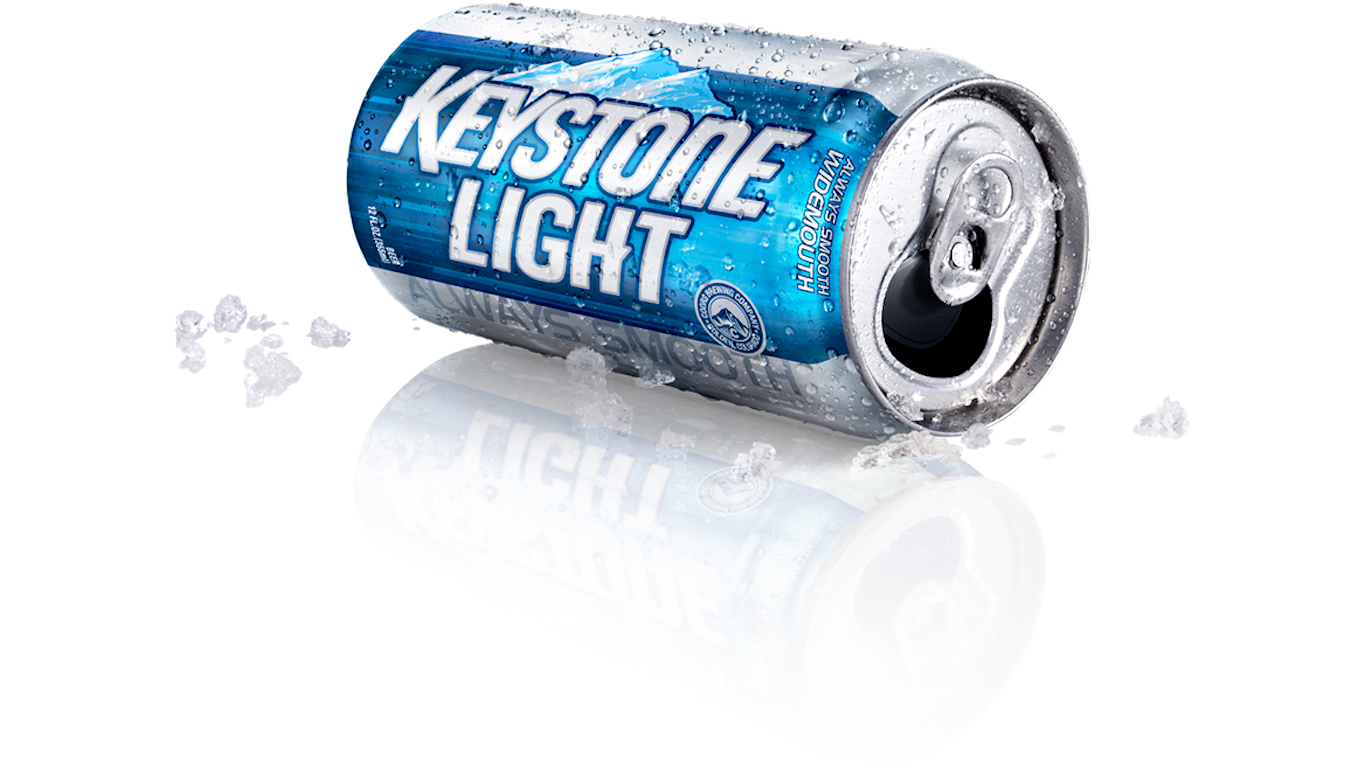
12. Keystone Light
> Parent company: Molson Coors Brewing Company
> Barrels shipped in 2017: 3.5 million
> Change from 2016: 6.3%
> Market share: 1.6%
Keystone is one of six light beers that shipped over 3 million barrels of beer in the U.S. in 2017. But unlike most other light beers, Keystone Light shipments increased in 2017 compared to the year before. The 101-calorie light beer has outsold all other Keystone beers — the others shipped less than 1 million barrels.

11. Heineken
> Parent company: Heineken International
> Barrels shipped in 2017: 4.0 million
> Change from 2016: -0.9%
> Market share: 1.8%
This 154-year-old Dutch brewery has been ranked for the past two years as the world’s third most valuable beer brand — after Bud Light and Budweiser — by Brand Finance. Though it’s sometimes described as having a skunky aroma, it remains one of the world’s most popular lagers, and it has been hailed for its consistency.
[in-text-ad]
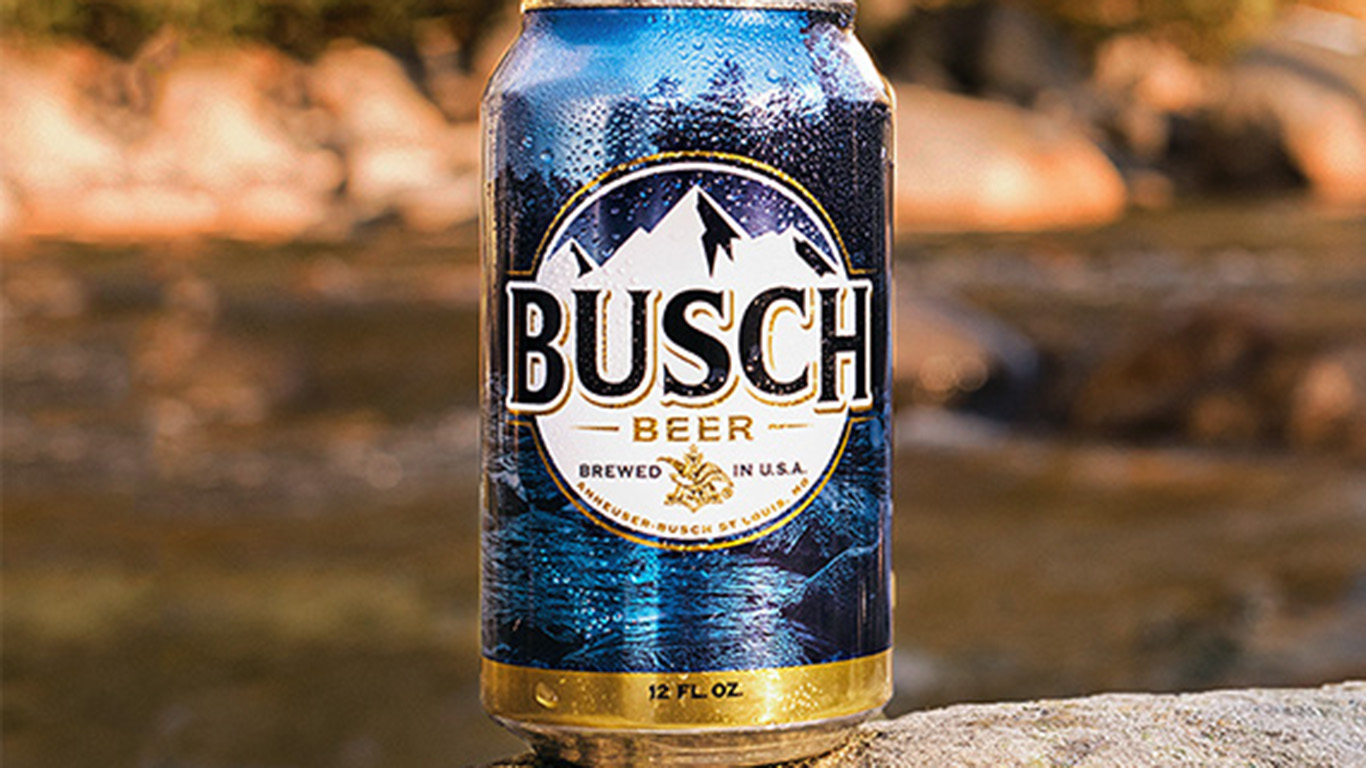
10. Busch
> Parent company: Anheuser-Busch InBev
> Barrels shipped in 2017: 4.7 million
> Change from 2016: -2.6%
> Market share: 2.2%
Busch is one of six beers from Anheuser-Busch InBev that rank among the top 10 beers in terms of U.S. shipments. Though there is a Busch Light, Busch is also relatively low in calories compared to other similar brews. It has just 114 calories and 4.3% alcohol by volume.
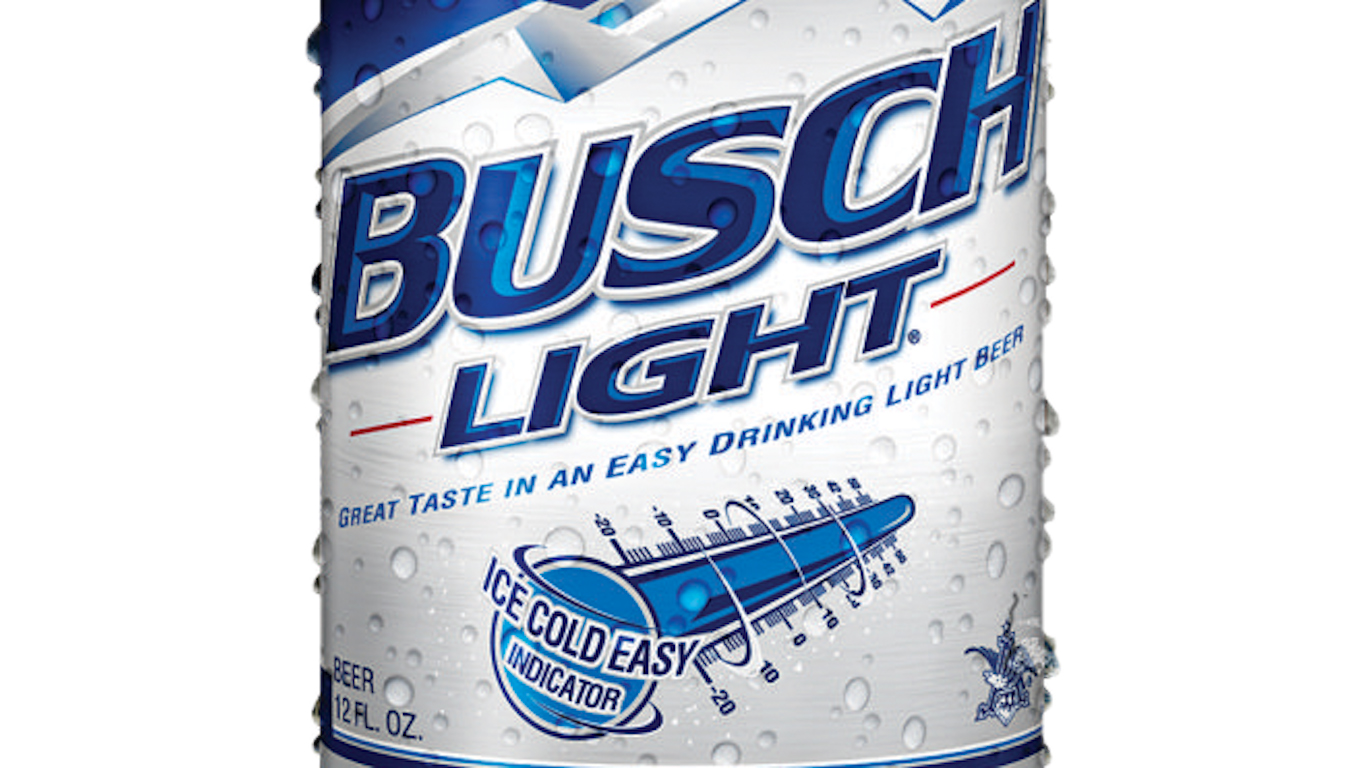
9. Busch Light
> Parent company: Anheuser-Busch InBev
> Barrels shipped in 2017: 6.4 million
> Change from 2016: 0.4%
> Market share: 3.0%
The light version of Busch, this beer has 95 calories, fewer than all but a handful of other light beers. Reviews describe it as watery, flavorless, and boring, but its sales figures suggest that it has a good following.
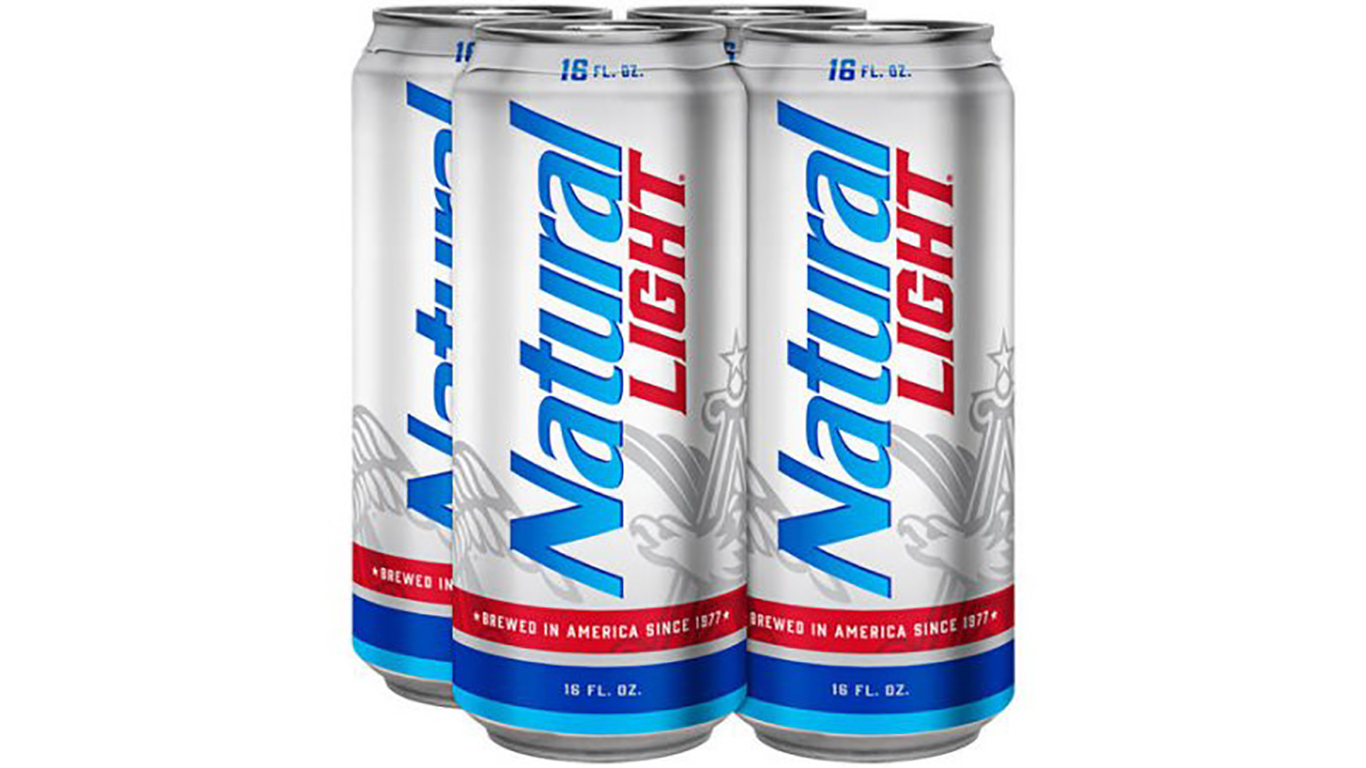
8. Natural Light
> Parent company: Anheuser-Busch InBev
> Barrels shipped in 2017: 6.5 million
> Change from 2016: -1.9%
> Market share: 3.0%
Natural Light — or Natty Light for many college students in the U.S. — is one of the lightest beers on the market. One Natural Light contains just 95 calories and 3.2 grams of carbs. Many drinkers will also tell you that Natural Light is also light on taste.
[in-text-ad-2]
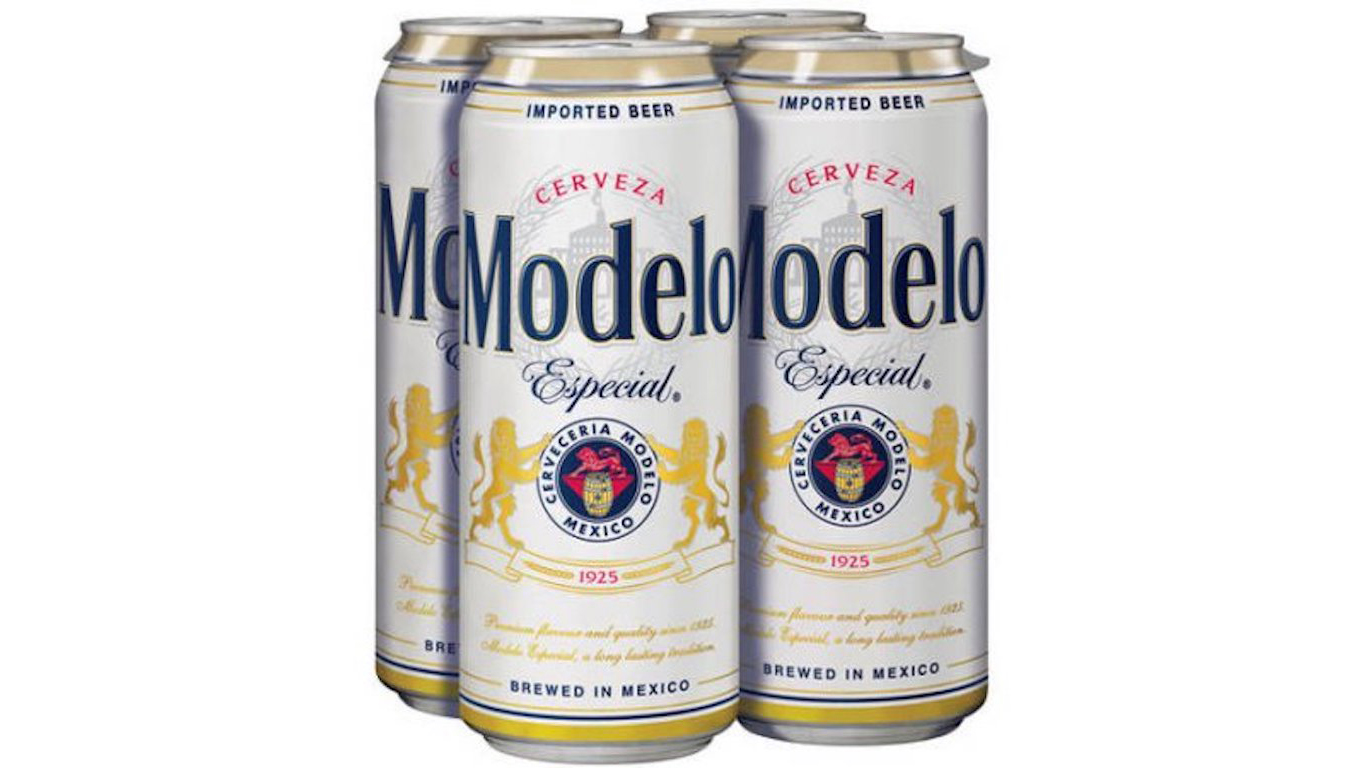
7. Modelo Especial
> Parent company: Constellation Brands
> Barrels shipped in 2017: 7.2 million
> Change from 2016: 17.4%
> Market share: 3.3%
Modelo Especial is the second fastest growing major beer brand over the past decade. In 2007, Constellation Brands shipped 1.6 million barrels of the Mexican pilsner-style lager in the U.S. Ten years later, the company shipped 7.2 million barrels. First brewed in 1966, the brand is available in both bottles and cans. It’s the most popular canned beer in Mexico today.
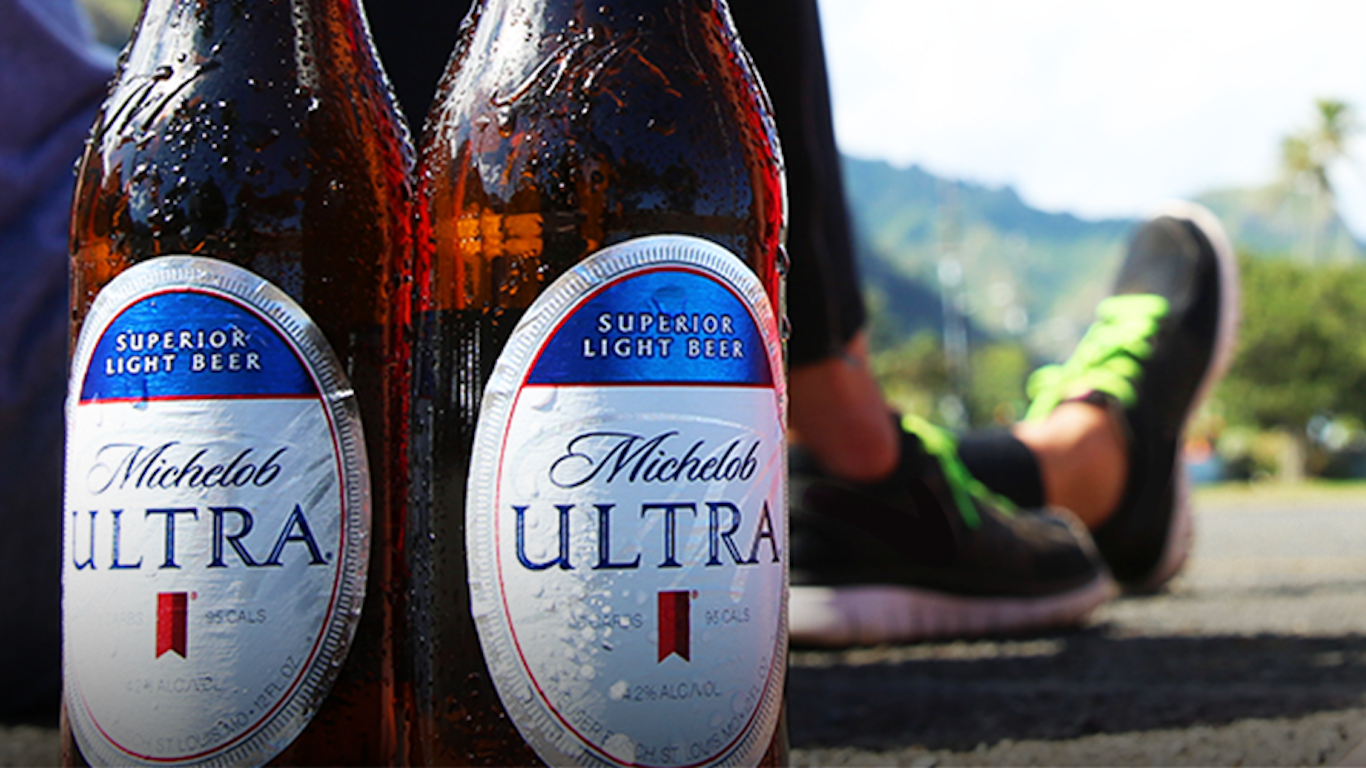
6. Michelob Ultra
> Parent company: Anheuser-Busch InBev
> Barrels shipped in 2017: 7.7 million
> Change from 2016: 21.3%
> Market share: 3.6%
Michelob Ultra has experienced greater growth from 2016 to 2017 than any other major beer in the U.S. market. The light lager’s shipments increased from 6.4 million in 2016 to 7.7 million last year, an increase of more than 21%. Over the past 10 years, Michelob Ultra sales have more than doubled. The lager is marketed as fitting a healthier lifestyle because of its lower calorie and carb count compared to other similar beers. Its commercials depict toned and trim people running, hiking, and biking before popping open bottles of Michelob Ultra.
[in-text-ad]
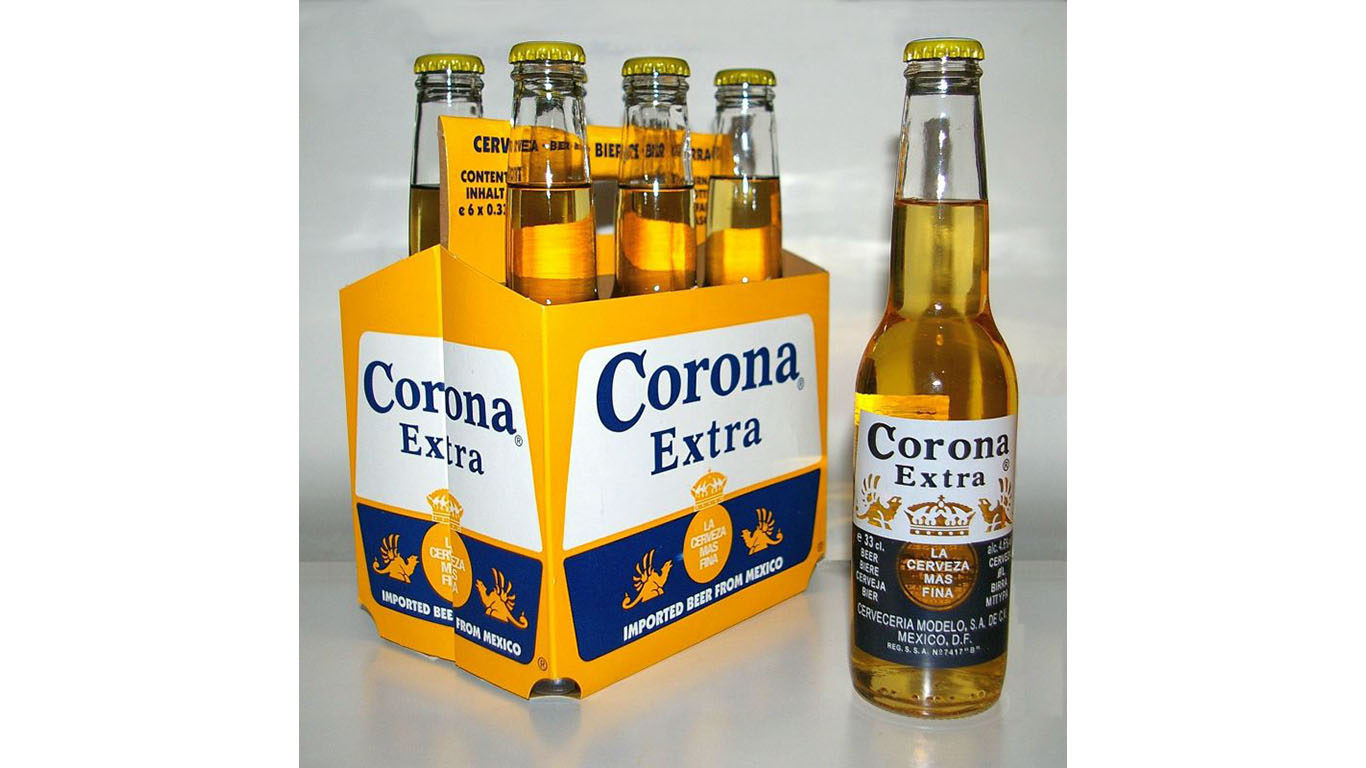
5. Corona Extra
> Parent company: Constellation Brands
> Barrels shipped in 2017: 8.7 million
> Change from 2016: 3.6%
> Market share: 4.1%
Of the five most popular beers in America, Corona Extra was the only one to ship more beer in 2017 than it did the previous year. First brewed in Mexico City in 1925, this clear golden pilsner is the best selling beer in Mexico and the country’s leading exported beer. Corona Extra, along with Modelo Especial, are both a part of Constellation Brands.
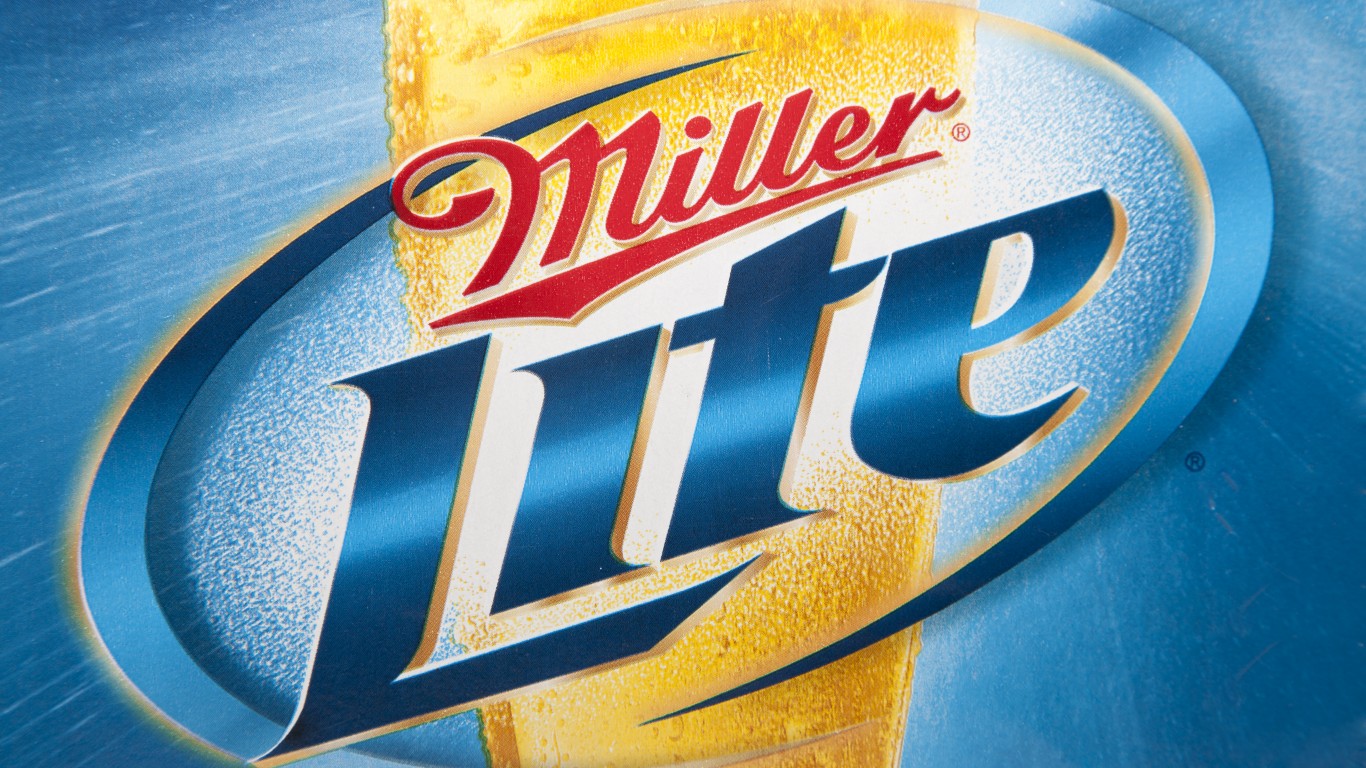
4. Miller Lite
> Parent company: Molson Coors Brewing Company
> Barrels shipped in 2017: 13.1 million
> Change from 2016: -2.8%
> Market share: 6.1%
After debuting in 1975, Miller Lite hit its sales peak in 1990, shipping 19 million barrels. These days, Molson Coors is shipping about 13.1 million barrels per year. Miller Lite, like many other large American brews, is losing a chunk of its market share to increasingly popular imports and craft beer.
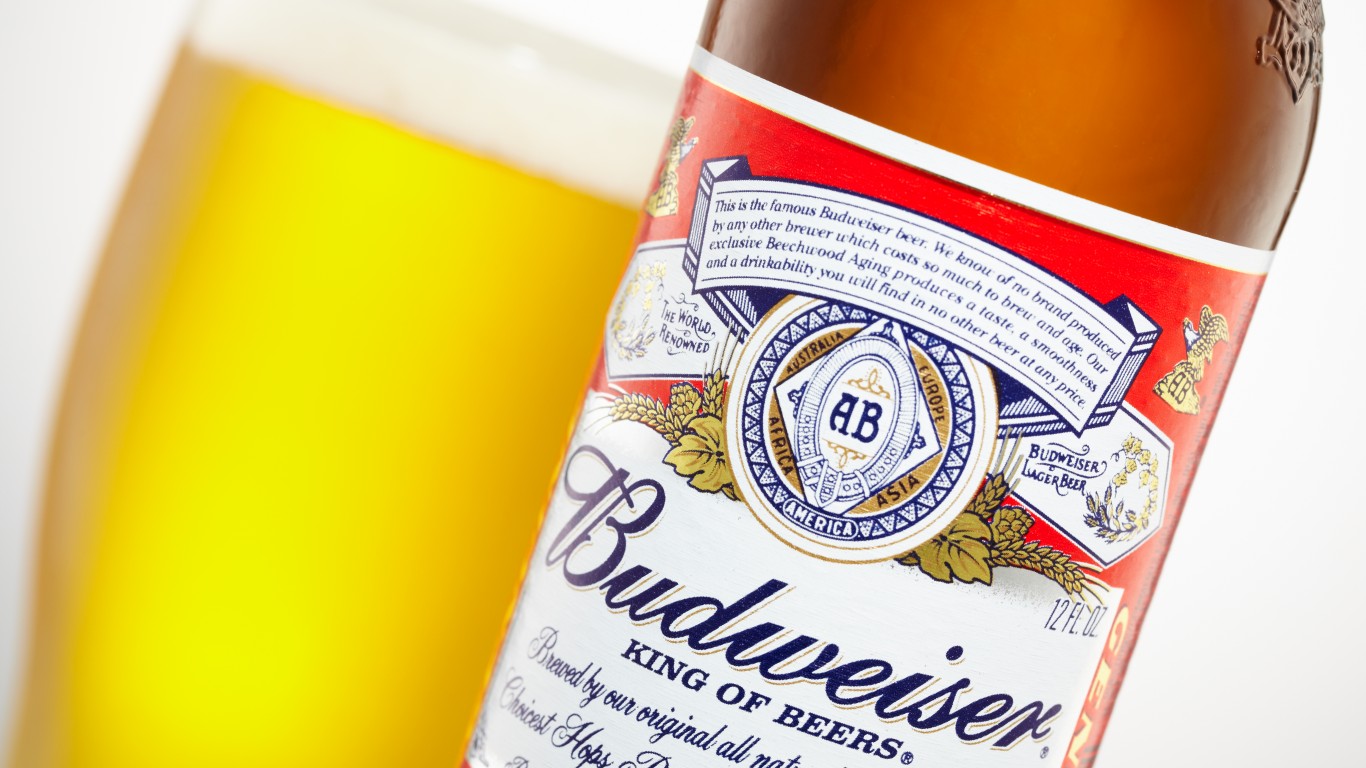
3. Budweiser
> Parent company: Anheuser-Busch InBev
> Barrels shipped in 2017: 13.3 million
> Change from 2016: -7.5%
> Market share: 6.2%
First produced in 1876, the self-styled “King of Beers” is distributed in more than 70 countries and is one of the world’s best-selling brews. The brand brags about being “beechwood aged.” This doesn’t mean that it’s aged in beechwood casks the way wine is aged in oak. The process involves adding pieces of beechwood to the lagering tanks. Some of the yeast involved in the fermenting process collects on the wood and increases the yeast’s contact with the beer. This helps reduce fermentation by-products that may lend an undesirable flavor to the beer.
[in-text-ad-2]
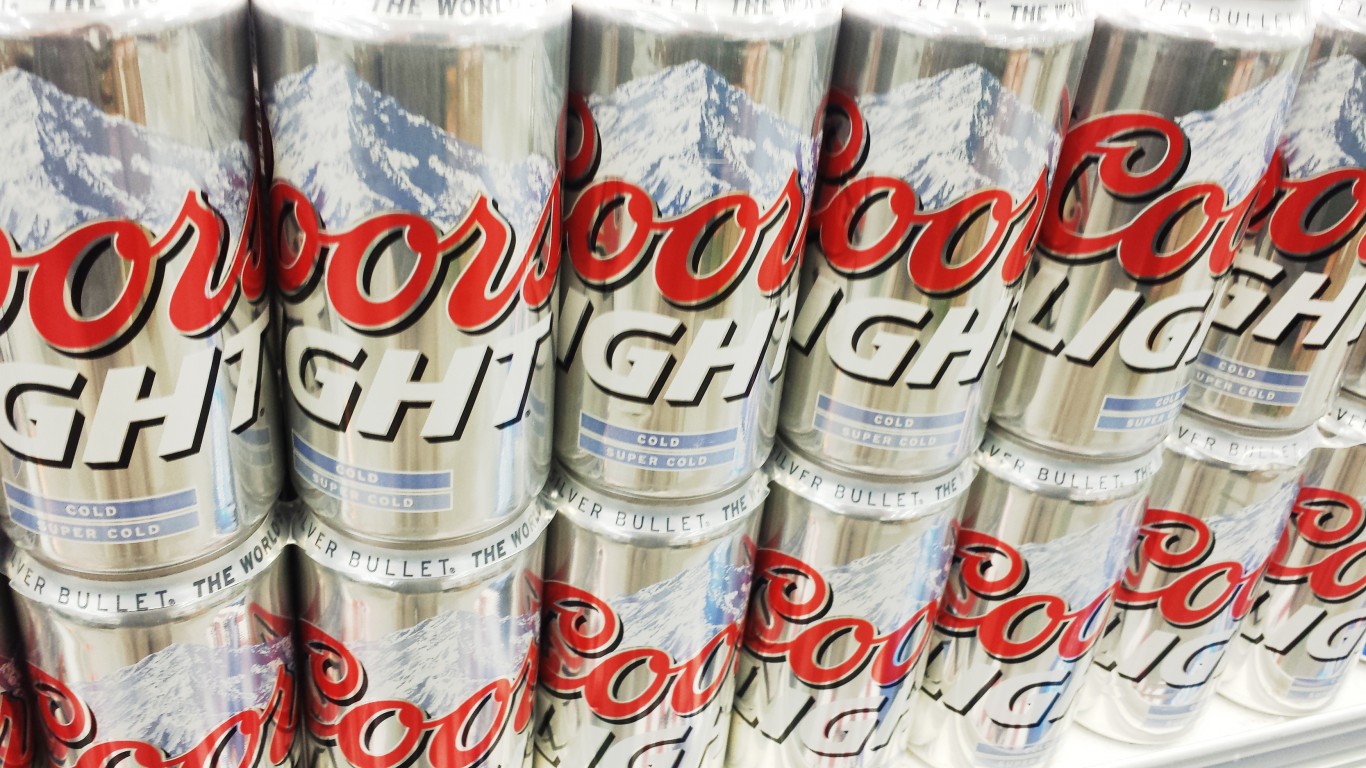
2. Coors Light
> Parent company: Molson Coors Brewing Company
> Barrels shipped in 2017: 16.5 million
> Change from 2016: -4.1%
> Market share: 7.7%
For many years, Coors beer was only available in parts of the western United States, giving it a mystique that other major beer brewers couldn’t match. That mystique has since faded, as Coors Light and other products from the brewery became available in larger swaths of the country in the 1980s before becoming nationally available in 1991. Now, Coors Light is the second most popular beer in the country, though it comes nowhere close to number one.
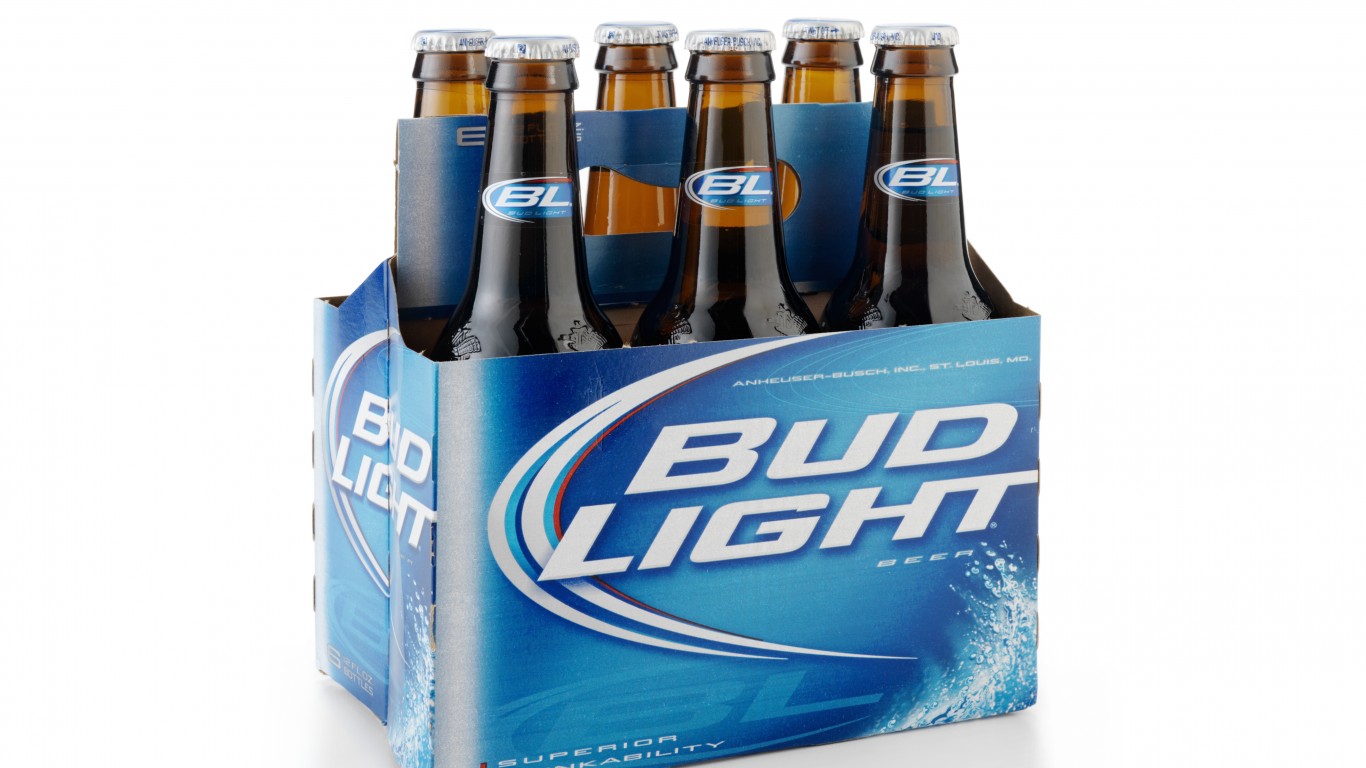
1. Bud Light
> Parent company: Anheuser-Busch InBev
> Barrels shipped in 2017: 33.0 million
> Change from 2016: -6.2%
> Market share: 15.4%
Bud Light, first sold nationwide in 1982, is by far America’s favorite beer. Its parent company, Anheuser-Busch InBev, shipped more than 33 million barrels of the light lager in 2017 — double the shipments of the next most popular beer. Shipments of Bud Light, however, dropped by 2.2 million barrels from 2016. Reviewers commonly describe it as thin and watery, but also drinkable and refreshing.
If you missed out on NVIDIA’s historic run, your chance to see life-changing profits from AI isn’t over.
The 24/7 Wall Street Analyst who first called NVIDIA’s AI-fueled rise in 2009 just published a brand-new research report named “The Next NVIDIA.”
Click here to download your FREE copy.
Thank you for reading! Have some feedback for us?
Contact the 24/7 Wall St. editorial team.